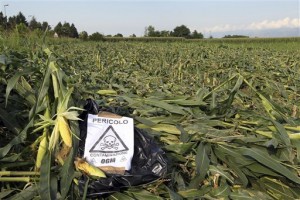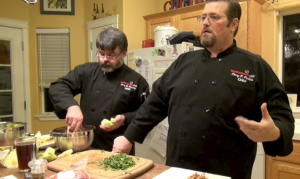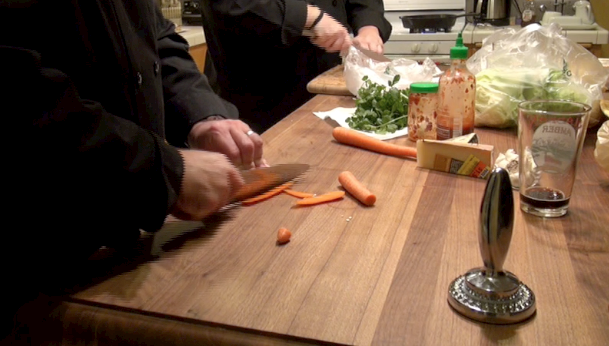Tiffany Ayers, organizer of Portlandâs March Against Monsanto. From Ayersâ LinkedIn profile, used with permission.
Sitting on a porch, Internet twizzling, on a tranquil breeze-kissed afternoon in the Pacific NorthwestÂÂ is an idyllic way to time-while. In late March of this year, Tiffany Ayers found that it also works well for stumbling into instantaneous activism, and thatâs how she did.
The Accidental Making of a Food Activist
âI was sitting outside reading an article about the passing of HR 933 and I got so angry I had to do something.â Ayers refers to Section 735 of the bill: the âBiotech Riderââ also called the âMonsanto Protection Act,â a piece of legislation crafted by Senator Roy Blunt of Missouri that has amplified the global conflict between agri-business and food activists. In 2011-2012, between campaign committee and leadership PAC committee donations, Blunt received $98,250 from Missouri-based agri-business giant, Monsanto, a company under intense public pressure.
âI donât remember exactly how I got there, but I found a site by Tammy Canal and contacted her to ask how I could get involved,â recalls Ayers. Canal is the founder of March Against Monsanto, a grassroots NGO seeking to raise awareness of GMOâs in the worldâs food and crop seed supply, promote the labeling of foods containing genetically modified organisms, and increase grassroots activism to insure seed diversity and eliminate environmental pollutants.
Two months later, Ayers, a media student with an event-planning background, finds herself rally organizer for Portland, Ore. âI had no idea how much work this was going to be,â says Ayers, sounding like a harried mom after of a long day who finally gets to sit down for a full deep breath. She pauses, gathering her thoughts:
âIâve always worked with an established team, but Iâve had to do this from scratch⌠Weâve had to do this from scratch,â Ayers revises, citing the assistance of a handful of friends and volunteers. Of the 421 cities, spanning six continents, this small band of first-time Portland activists expect the second highest projected turn out of them all, trailing only New York City, New York.
The Welcome Reach of Social Media
Ayers credits social media for the sudden rise in organized food activism, and Facebook in particular for increased March-Against-Monsanto awareness. On March 26, when, President Obama signed the bill, she had 750 Facebook friends. She sent invitations to them all, and like the 1980âs Faberge shampoo marketing campaign, word spread exponentially. As of this writing, the Portland rally has 6,500 âconfirmedâ and âmaybeâ attendees, with just under 49,000 non-responding invitees.
With a sudden semi-celebrity status, Ayers has had to make some changes in the way she interacts online. The campaign dominates the content of her Facebook page, and she has gained over 150 new âfriendsâ: she will create another private page when she regains some dispensable time.
Connecting online, Ayers and other rally leaders, many of whom are also first-time organizers, offer one another support. Their goal is to create a family-friendly feel to what they view as a first step in a food revolution: building community awarenesss. According to Ayers, organizers recognize that certain elements will use any public gathering to create discord. “That is not what this is about,” Ayers affirms.
Ayers, in the interest of creating a safe, family-centered, community-awareness event, welcomes the support of Portland Police. âI initially got some flack for that on the Facebook page, so I made it very clear that no violence of any kind will be welcomed.â Ayers recognizes that pesticide contamination and threats to bio-diversity threaten us all equally — that March Against Monsanto isnât an âusâ vs âthemâ issue. âPolicemen need to eat real, whole, safe food too. This is about all of us,â she says.
The Full-Circle Journey to a Calling
According to her LinkedIn profile Ayers worked at Ashland Chemical from 1999-2005 where she was first trained to read and file Material Safety Data Sheets (âMSDSâ), the informational sheets that OSHA requires businesses and commercial vehicles to carry for each chemical present. She always felt a bit of tension about being a âbit of a tree-hugger working for a chemical company,â but it was there where she realized the pervasive reach of petroleum chemicals in her everyday life.
Reflecting more, she appreciates the inside view she gained of the industry as the big six petro-chemical, bio-tech, agri-business giants were consolidating with various mergers and acquisitions.
When the bullhorn is neatly tucked away Saturday evening, Ayersâ activism and community organization will not be at an end. Her life has a new trajectory. Ayers looks to get involved in the food labeling movement, locally, with GMO Free Oregon and has been talking with staff from Food and Water Watch. âI have found something I am really passionate about that matters,â she notes.
The Logistical Details of the Event
Portlandâs march will begin on May 25 at 11 a.m. PST at Holladay Park near Lloyd Center. Attendees are encouraged to take the Max lightrail into town as parking will be limited.
View MAM Route Map in a larger map











 Facebook
Facebook Google
Google LinkedIn
LinkedIn SlideShare
SlideShare